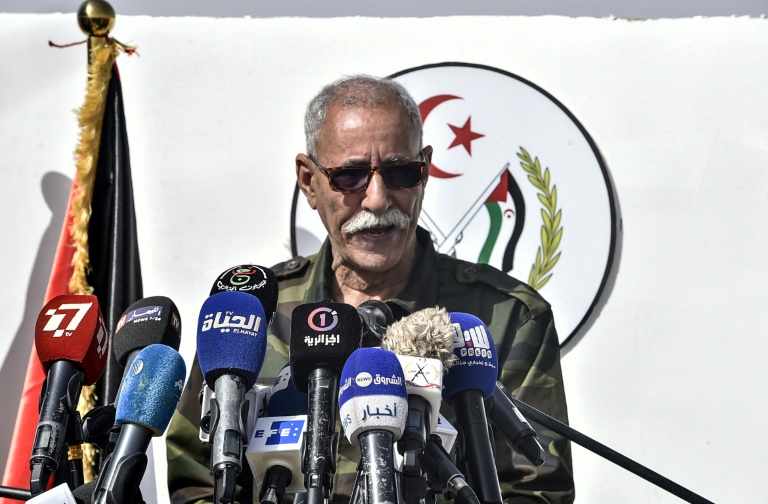The leader of Western Sahara’s independence movement returned to Algeria Wednesday after six weeks of medical treatment in Spain that unleashed a tetchy diplomatic standoff between Rabat and Madrid.
Polisario Front leader Brahim Ghali flew out of Pamplona airport in northern Spain overnight, with a Spanish government source telling AFP on Wednesday morning he was “in Algeria”.
Ghali arrived in Algiers at around 3:00 am (0200 GMT), where he will continue his recovery from a severe case of Covid-19, top Polisario official Abdelkader Taleb Omar told Algeria’s APS news agency.
He added that Ghali’s improving health meant he no longer needed hospitalisation in Spain.
However Ghali was nonetheless immediately admitted to a military hospital in Algiers, where he was visited by President Abdelmadjid Tebboune and army chief of staff Said Chengriha, Algerian public television showed.
Tebboune described the visit as “his duty” and reaffirmed his support for Ghali’s cause, APS reported. The Algerian president also thanked Spain for welcoming Ghali and for the “delicate” care he had received.
Algeria is the main supporter of the Polisario Front, which has for decades fought Morocco for the independence of Western Sahara, a desert region bigger than Britain which was a Spanish colony until 1975.
Ghali’s imminent departure had been announced late Tuesday by Spain’s foreign ministry — who had informed their Moroccan counterparts — without saying where he was going.
His departure came hours after he was quizzed by a Spanish judge over allegations of torture and genocide, which he denied, in a video hearing from a hospital in the northern town of Logrono.
During the hearing, the judge declined to issue any precautionary measures such as seizing Ghali’s passport or holding him in preventative custody, saying there were no “clear indications of his involvement” in the alleged crimes.
Critically ill, Ghali secretly landed in Spain on April 18 aboard a medicalised Algerian government plane, sparking a diplomatic standoff with Morocco.
– From ‘blackmail’ to ‘respectful ties’ –
The incident triggered a string of terse exchanges which sharpened after up to 10,000 migrants surged into Spain’s North African enclave Ceuta, as guards in neighbouring Morocco looked the other way.
The Socialist government of Pedro Sanchez accusing Rabat of “blackmail” and “aggression” over the influx.
It was not immediately clear how Ghali’s departure from Spain would affect the tension — although Madrid appeared to be easing its tone on Wednesday, with Sanchez’s deputy Carmen Calvo speaking of “respectful and constructive relations” and “common interests”.
Rabat remained silent, although it too had sought to step back from the crisis on Tuesday, with King Mohammed VI saying Morocco wanted to “settle definitively” the situation of the unaccompanied minors still in Ceuta.
However, on Monday it had said the crisis between the two countries “would not be resolved with (Ghali’s) departure” because it was linked to Spain’s position on Western Sahara which was “a sacred issue for the Moroccan people”.
Speaking to AFP, a diplomatic source said the Moroccans had been “threatening to break off diplomatic relations with Spain for a few days now.
“But the question is whether they will go that far, and if not, what options are on the table after the rhetorical outburst of the last few days.”
– Strategic resources –
Isaias Barrenada, an expert on international relations at Madrid’s Complutense University, said Ghali’s departure meant Morocco had nothing left to complain about.
Ghali’s presence in Spain “was just an easy pretext… to put pressure on Madrid and its position on the Sahara,” he told AFP.
Morocco’s authorities have long wanted Spain to acknowledge their authority over Western Sahara, as Washington did in December under former president Donald Trump.
But Spain says a solution to the status of the disputed territory can only come from a United Nations-brokered agreement.
Considered a war criminal by Morocco, Ghali has headed the Polisario Front since 2016 and is president of the Sahrawi Democratic Arab Republic, a self-declared state in an almost-landlocked area flanking Mauritania’s border.
It covers around a fifth of Western Sahara, while the rest is run by Morocco.
Rabat has offered Western Sahara autonomy but insists that the territory, which is rich in phosphates and offshore fishing, is part of the Moroccan kingdom.










